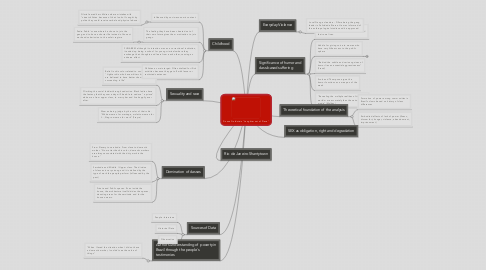Donna Goldstein "Laughter out of Place"
by Yisel Diaz


1. Author's understanding of poverty in Brazil through the people's testimonies
1.1. "When I faced the situation when I did not have a domestic worker, I couldn't see the value of things"
2. Sources of Data
2.1. People -Interviews
2.2. Historical Data
2.3. Observation
3. Rio de Janeiro Shantytown
4. Domination of classes
4.1. From Slavery to servitude. From slave to domestic worker. "No matter the skin color, domestic workers are always associated with the dirty work in the house."
4.2. Servitude and Middle / Upper class. The division of classes is very strong and it is defined by the type of work the people perform (influenced by the past)
4.3. Private and Public spaces. Even inside the house, the architecture itself divides the spaces, denoting areas for the servitude and for the house owners.
5. Sexuality and race
5.1. Belief in skin color related to social class. "Lighter skin who have whiter characteristics are believed to have better chances of succeeding in life"
5.2. Climbing the social ladder through seduction. Black ladies have the fantasy that they some day will be able to seduce "a prince" white man from upper class, to marry her and live happily ever after.
5.3. Woman being judge by the color of their skin. "White woman for marriage, mulatto woman for f..., Negro woman for work" (Freyre)
6. Childhood
6.1. Influenced by socio-economic context.
6.1.1. Gloria feared her children where mistaken with "street children because of their looks. If caught by police they could receive verbal and physical abuse.
6.2. The feeling they have been cheated out of their own future gives them motivation to join gangs.
6.2.1. Pedro Pablo's case where he chose to join the gang and to have a shorter life instead of honest work and submission to the unfair regime
6.3. FUNABEM although its intention was as a correctional institution, it ended up being a school for young criminals where they exchange their thoughts and learn from each other, causing an adverse effect.
6.4. Children as main target- Often drafted for illicit activities because they get off with lesser or restricted sentences.
7. Significance of humor and class-based suffering
7.1. Interpretative Method to understand the complex ways in which people comprehend their own lives.
7.2. Vehicle for giving voice to women who have very little access to the public sphere
7.2.1. Oral culture where "words fly away"
7.2.2. Written example: Quarto de Espejo by Carolina Maria de Jesus.
